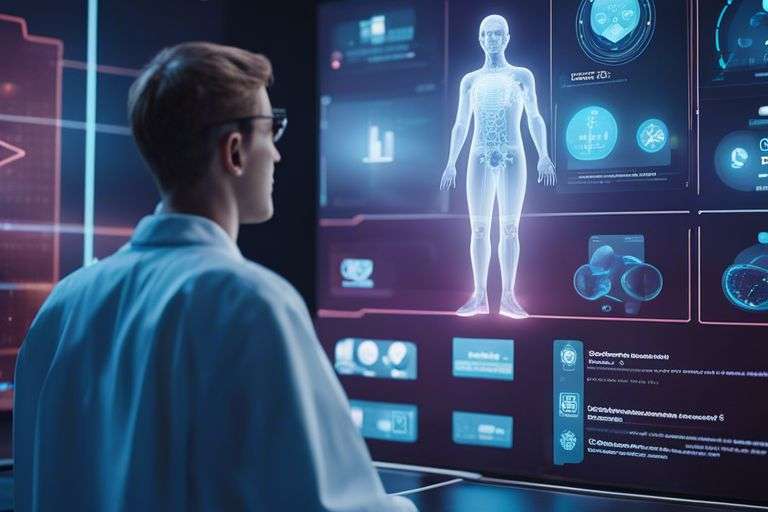You may have heard about the rise of AI-powered virtual health assistants, but do you know how they are revolutionizing patient care? These intelligent and innovative virtual assistants are designed to provide personalized and efficient support to patients, offering a range of services from appointment scheduling and medication reminders to personalized health coaching and medical advice. The potential impact of these AI-powered assistants on the healthcare industry is immense, with the ability to improve patient outcomes, increase access to care, and decrease healthcare costs. However, as with any technological advancement, there are also ethical and privacy concerns that need to be addressed. In this blog post, we will explore the benefits and challenges of AI-powered virtual health assistants and discuss why they are considered the future of patient care.
Key Takeaways:
- Personalized Healthcare: AI-powered virtual health assistants can provide personalized care and treatment plans based on individual patient data, leading to more effective and efficient healthcare delivery.
- 24/7 Access to Care: Virtual health assistants enable patients to access healthcare resources and seek medical advice at any time, improving accessibility and convenience for patients.
- Improved Patient Engagement: AI-powered virtual health assistants can engage and educate patients, promoting self-care and proactive healthcare management, leading to better health outcomes.
- Efficient Healthcare Operations: Virtual health assistants can streamline administrative processes, automate routine tasks, and optimize resource allocation, ultimately improving the efficiency of healthcare operations.
- Enhanced Patient Satisfaction: The use of AI-powered virtual health assistants can enhance the overall patient experience, leading to increased patient satisfaction and loyalty to healthcare providers.
Understanding AI-Powered Virtual Health Assistants
Any discussion about the future of patient care would be incomplete without understanding the role of AI-powered virtual health assistants. These advanced healthcare tools are revolutionizing the way medical services are delivered and are poised to become an integral part of patient care in the coming years.
Defining Virtual Health Assistants
Virtual health assistants are AI-powered software applications that provide personalized support and guidance to patients, healthcare professionals, and caregivers. These assistants can perform a wide range of tasks, including scheduling appointments, monitoring vital signs, providing medication reminders, and offering personalized health advice based on individual medical history.
Key Features of AI in Healthcare Applications
AI-powered virtual health assistants come with a range of key features that make them indispensable in modern healthcare settings. Some of the key features include:
- Natural Language Processing: Allows the virtual assistant to understand and respond to human language in a natural and conversational manner.
- Machine Learning: Enables the assistant to learn from patient interactions and continuously improve its ability to provide accurate and personalized support.
- Diagnostic Capabilities: Some virtual health assistants are equipped with the ability to analyze symptoms and provide initial diagnostic suggestions to patients.
- Remote Monitoring: Allows for continuous monitoring of patient vital signs and health metrics, providing early intervention in case of any anomalies.
- Personalized Health Plans: Virtual assistants can create and update personalized health management plans based on individual medical history and current health status.
Assume that the integration of these features into virtual health assistants can significantly enhance patient care outcomes and improve overall healthcare delivery.
Benefits of AI-Powered Virtual Assistants in Patient Care
If you’re curious about the benefits of AI-powered virtual assistants in patient care, you’ve come to the right place. These virtual assistants are revolutionizing the way healthcare is delivered, making it more efficient and accessible for patients.
Accessibility and Convenience for Patients
With AI-powered virtual health assistants, you have access to healthcare services 24/7, anytime, anywhere. You can easily schedule appointments, access medical records, and receive medication reminders through a simple chat interface. This level of accessibility and convenience ensures that you have immediate access to care, reducing the need for unnecessary office visits and long wait times.
Enhancing Patient Engagement and Experience
By using AI-powered virtual assistants, you can proactively manage your health by receiving personalized recommendations based on your medical history and lifestyle. The virtual assistant can also provide you with educational resources and guide you through your treatment plan, empowering you to take charge of your health. This enhanced engagement and experience lead to better treatment outcomes and overall satisfaction with your healthcare journey.
By utilizing AI-powered virtual assistants in patient care, you are not only benefitting from enhanced accessibility and convenience, but you are also actively engaged in managing your health with personalized support. For more real-world examples and use cases of AI-powered virtual assistants in healthcare, you can read more at Healthcare Virtual Assistants: Use Cases, Examples, and…
Challenges and Considerations
Now, as you consider the potential benefits of AI-powered virtual health assistants in patient care, it’s important to also be aware of the challenges and considerations that come with their implementation. In a recent article “AI Transforms Patient Care: Meet Virtual Health Assistants”, the author discusses the transformative impact of AI in patient care and the challenges that come with it.
Ensuring Privacy and Security of Patient Data
One of the most crucial considerations when integrating AI-powered virtual health assistants into patient care is ensuring the privacy and security of patient data. With the vast amount of sensitive information that these assistants handle, it is essential to have strong security measures in place to protect against unauthorized access and data breaches. You must be assured that stringent security protocols are in place to safeguard your personal health information from any potential risks. It’s essential to ensure that the AI system complies with all relevant privacy regulations and utilizes encryption and other security measures to protect your data from unauthorized access.
Addressing Ethical Concerns and Building Trust
Another critical challenge in the use of AI-powered virtual health assistants is addressing ethical concerns and building trust with patients. As AI continues to play a larger role in healthcare, there is a need to ensure that ethical standards are upheld and that patients can trust the technology to provide accurate and reliable assistance. You should feel confident that the virtual health assistant is designed to prioritize your best interests and adhere to ethical guidelines. It’s important to have transparency around how the AI makes decisions and to be informed about the limitations of the technology to build trust in its capabilities.
The Future of Virtual Health Assistants
Despite being a relatively new addition to the healthcare landscape, AI-powered virtual health assistants are shaping up to be the future of patient care. As technology continues to advance, these virtual assistants are expected to play an increasingly prominent role in the healthcare industry, revolutionizing the way patients interact with their care providers and manage their health.
Innovations on the Horizon
With ongoing advancements in artificial intelligence and machine learning, the future of virtual health assistants holds promise for truly personalized and proactive care. These assistants will become even more adept at interpreting and responding to your health data, helping you identify potential health issues before they escalate. By leveraging predictive analytics and real-time monitoring, virtual health assistants will empower you to take a more proactive approach to managing your health, ultimately leading to better outcomes and a higher quality of life.
Integrating with Traditional Healthcare Systems
One of the most significant developments on the horizon is the seamless integration of virtual health assistants with traditional healthcare systems. This integration will enable your virtual assistant to have access to your complete medical history, facilitating more informed decision-making and personalized recommendations. Additionally, it will enable your virtual assistant to collaborate with your healthcare providers, ensuring that you receive coordinated and comprehensive care across all aspects of your health. This integration has the potential to improve efficiency, reduce medical errors, and ultimately enhance the overall patient experience.
AI-Powered Virtual Health Assistants – The Future of Patient Care
Presently, AI-powered virtual health assistants are revolutionizing the way patient care is delivered, offering personalized and efficient support to individuals around the clock. These virtual assistants are improving patient outcomes by providing real-time information, reminders, and guidance, ultimately leading to better adherence to treatment plans and overall wellness. By harnessing the power of AI, healthcare providers can deliver a higher level of care and support to their patients, ensuring that you receive the personalized attention and guidance you need to manage your health effectively. As the technology continues to advance, AI-powered virtual health assistants will play an increasingly vital role in transforming the healthcare industry and enhancing the overall patient experience.
FAQ
Q: What are AI-Powered Virtual Health Assistants?
A: AI-Powered Virtual Health Assistants are digital platforms that use artificial intelligence to interact with patients, provide health-related information, assist with medication reminders, and offer support for managing chronic conditions.
Q: How do AI-Powered Virtual Health Assistants improve patient care?
A: AI-Powered Virtual Health Assistants can improve patient care by providing timely and accurate information, offering personalized support, and helping patients take control of their health through proactive monitoring and reminders.
Q: Are AI-Powered Virtual Health Assistants secure and private?
A: Yes, AI-Powered Virtual Health Assistants prioritize the security and privacy of patient data. They utilize advanced encryption and adhere to strict privacy regulations to ensure that patient information remains confidential and secure.
Q: Can AI-Powered Virtual Health Assistants replace in-person medical care?
A: While AI-Powered Virtual Health Assistants can enhance patient care and provide valuable support, they are not a replacement for in-person medical care. They are designed to complement traditional healthcare services and support patients in between visits to healthcare providers.
Q: What does the future hold for AI-Powered Virtual Health Assistants?
A: The future of AI-Powered Virtual Health Assistants looks promising, with continued advancements in artificial intelligence and healthcare technology. These virtual assistants are expected to play an increasingly important role in patient care, offering personalized support and improving healthcare outcomes.




